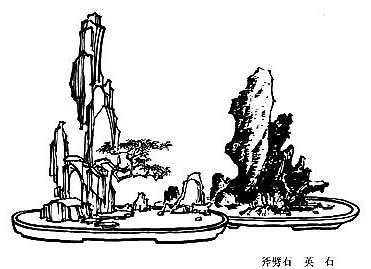36 Ji 
 – Thirty-Six Strategies
– Thirty-Six Strategies
A recently uncovered notebook of 36 proverbs commented as military tactics that helps dealing with conflicts. Tr. Verstappen (en), Doc Mac Jr (fr).
19. Steal The Firewood From Under the Pot
20. Trouble The Water To Catch The Fish
21. Shed Your Skin Like the Golden Cicada
22. Shut the Door to Catch the Thief
23. Befriend a Distant Enemy to Attack One Nearby
24. Borrow the Road to Conquer Guo
36ji IV. 23.
Befriend a Distant Enemy to Attack One Nearby
It is known that nations that border each other become enemies while nations separated by distance and obstacles make better allies. When you are the strongest in one field, your greatest threat is from the second strongest in your field, not the strongest from another field.
Han Dynasty China
In 110 AD the province of Honan had suffered through droughts and floods, the harvests were poor and the people starving. The corrupt government only made matters worse and soon the whole province was in chaos. The numerous bands of bandits and robbers that roamed the countryside pillaging and terrorizing the population thwarted any hope of bringing in outside relief. A provincial official by the name of Yu-Hu was appointed full powers to try to restore some order to the province. When he arrived at the district capital he issued a notice that he was going to organized a military force and that he was looking for recruits. First he promised a pardon for past crimes and immunity for anyone who joined up. Then he announced that he was looking for men for three classes of troops. The first class of troops were to consist of men who had committed robbery and murder. They would be the commanders and receive the highest salaries. The second class would consist of men who had committed mere thievery. They would receive the next highest salaries. The third class would consist of men who had joined the robber bands simply because they were lazy and wished to avoid real labor. They would be paid the lowest salaries. Within a couple of weeks Yu-Hu had over three hundred new recruits. When they had been issued uniforms and weapons he had them paraded before him and addressed them as follows: "Your past deeds are now forgiven and you are free from prosecution. But you must still atone for the crimes you have committed against society. To do this you must now go out and hunt down all your past colleagues who have not answered my call." This they did and within a year the fraternity of bandits was extinct and the countryside made safe.
Verstappen
« S'allier avec les pays lointains et attaquer son voisin »
Des adversaires distants peuvent être des alliés temporaires.
Essaie de ne pas avoir trop d'ennemis en même temps.
Une autre expression familière prévient que
« l'eau lointaine ne convient pas pour éteindre l'incendie proche ».
Le danger immédiat doit être traité le premier.
S'il n'y a pas de court terme, inutile d'en chercher un long.
Quand la situation est bloquée et les possibilités restreintes, cherchez le profit à proximité et maintenez le danger au loin. Le feu au dessus du lac.*
Dans l'ancienne période des royaumes combattants, Qin émergea comme l'état le plus puissant et entreprit de détruire ses rivaux afin de gagner le contrôle de toute la Chine. Bien que supérieur en force à chacun des autres états, Qin n'était pas de taille face aux puissances combinées de tous les autres. Il adopta donc un plan consistant à éliminer un par un ses rivaux. La stratégie clef de cette entreprise fut l'alliance avec les états lointains et l'attaque de ceux qui étaient voisins. Elle fut proposée par Fan Sui, le fameux homme d'Etat de cette époque. L'application avec succès de ce plan mena à l'unification de la Chine sous la dynastie Qin.
Même une puissante armée ne peut se permettre de mener plusieurs batailles en même temps. Cette stratégie recommande donc au chef de guerre de traiter avec ses différents ennemis les uns après les autres. Ainsi vous êtes prévenus contre la tentation de rechercher des gains superficiels qui n'amènent aucun profit concret. En lançant une expédition contre un pays lointain, vous pouvez gagner une grande renommée. Mais la campagne sera à la fois coûteuse et risquée. Même si elle se déroule favorablement, on ne peut espérer conquérir et conserver le moindre arpent de terre. Il est préférable d'attaquer un état voisin tout en s'assurant de bonnes relations avec les pays lointains, afin qu'ils ne puissent pas secourir l'agressé.
* Texte issu de l'hexagramme n°38 du Yi Jing : Kui (la discorde)... D'un point de vue stratégique, tel celui adopté ici, des approches totalement différentes peuvent être utilisées pour parvenir aux mêmes fins (sic).
Doc Mac Jr

Thirty–Six Strategies – 36 Ji IV. 23. – Chinese off/on – Français/English
AliasThirty-Six Strategies, Thirty-Six Stratagems, Secret Art of War, Les 36 stratagèmes, Les Trente-six stratégies
The Book of Odes, The Analects, Great Learning, Doctrine of the Mean, Three-characters book, The Book of Changes, The Way and its Power, 300 Tang Poems, The Art of War, Thirty-Six Strategies
Welcome, help, notes, introduction, table.
Index – Contact – Top
